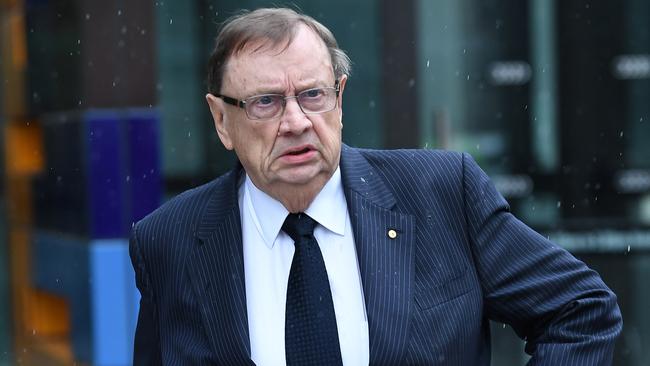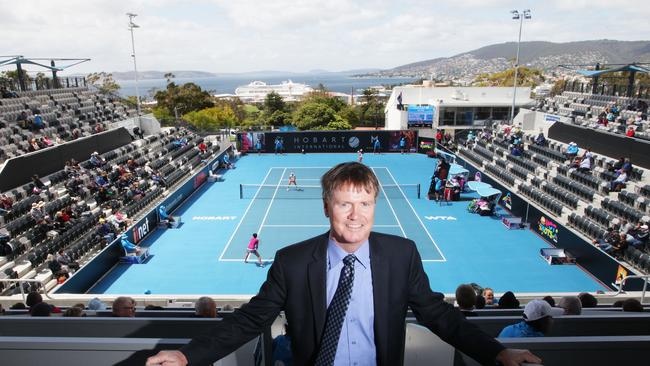‘Giant cover-up’ over tennis TV rights
Harold Mitchell was part of a ‘giant cover-up exercise’ regarding the awarding of TV rights to Seven West Media, a court has heard.

Harold Mitchell and former Tennis Australia president Steve Healy were part of a “giant cover-up exercise” regarding the awarding of broadcast rights to Seven West Media, something that was later subject of a “sham investigation”, a court has been told.
Michael Pearce SC, representing the Australian Securities & Investments Commission, made the allegations on day two of a civil lawsuit against the pair in the Federal Court in Melbourne
Mr Mitchell is accused by ASIC of using his former position as vice-president and director of the sporting body to advantage Kerry Stokes’s Seven Network by passing on confidential information regarding competing bids for the tennis broadcast rights. Mr Mitchell has denied the allegations.
READ MORE: Tennis boss Harold Mitchell ‘helped Seven win TV rights’ | Harold Mitchell denies aiding Seven win tennis rights | Harold Mitchell celebrates $49m office windfall | Why adman Harold Mitchell says ‘no’ to alcohol
The court also heard allegations Mr Mitchell had hidden conversations and the exchanging of information with Seven executives from the Tennis Australia board before the broadcaster was awarded television rights without them going to tender.
The court also heard that had Tennis Australia known about Mr Mitchell’s discussions, it would not have allowed a deal with Seven to be struck.

Mr Mitchell was accused of setting up a board subcommittee to deal with the broadcast rights — an extremely lucrative source of revenue for Tennis Australia — but the subcommittee never met before the rights were awarded in May 2013.
Seven paid $35m a year for the rights but rivals the Ten Network and IMG, a sports management company, are alleged to have offered to pay more — information Mr Mitchell is alleged to have not shared with the board.
Mr Pearce told the court the Tennis Australia board was unaware Mr Mitchell had been having “back-channel discussions” with Seven.
One former Tennis Australia director, former Bank of Melbourne chief executive Scott Tanner, told the court that if he had been aware of Mr Mitchell having unofficial talks with Seven, he would have demanded his resignation.
Fallout
“If they had known that was going on, they would not have accepted the deal and proposed to have the deal put out to the market,” he said of the directors.
Mr Pearce described the fallout after Seven got the rights as a “giant cover-up exercise” in which the media was told it was a good deal despite there being no tender process that could have sparked frenzied bidding. He also said Tennis Australia chief executive Steve Wood was sacked because he pushed back against Mr Mitchell, who was urging him to do a deal.
Mr Wood alleges he was asked to resign in August 2013, only months after the Seven deal was signed, despite previous good performance reviews. He said there had been unfair pressure from Mr Mitchell regarding budgets.
Judge Jonathan Beach questioned whether Mr Wood had reported Mr Mitchell’s pressure to the board. Mr Pearce said he had told Mr Healy, who asked Mr Mitchell to refrain from dealing with rights matters but Mr Mitchell refused.
“You have a dominating personality with a weak president … unable or unwilling to bring him into line,” Mr Pearce said.
A later investigation by a law firm into Mr Mitchell having potential conflicts of interest regarding his relationship with Seven was a “sham”, Mr Pearce alleged, because Mr Mitchell was not spoken to nor was anyone at Seven.
Mr Pearce said the case against Mr Mitchell involved “collusion with Channel Seven, interference with the duties of Tennis Australia officials and failure to disclose information to the board”.




To join the conversation, please log in. Don't have an account? Register
Join the conversation, you are commenting as Logout